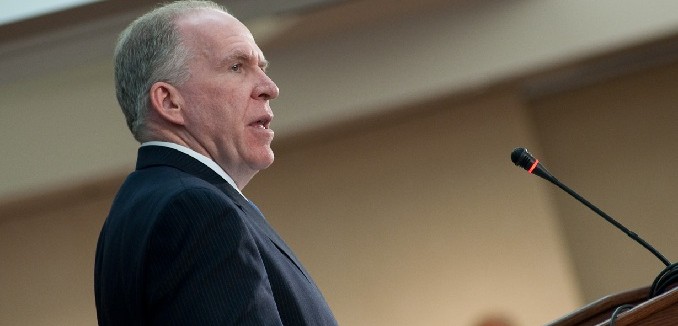John Brennan, the longtime counterterrorism advisor to President Barack Obama who this year became director of the CIA, flew Thursday to Israel — on a working visit not announced in advance. Israeli officials suggested that the main topic in consultations on Friday was Syria – that is, what might be done to prevent the transfer of chemical weapons and advanced missiles from the Syrian military to Syria’s radical groups, which are fighting Bashar al-Assad’s crumbling regime, or to Lebanese Shiite groups such as Hezbollah. Inevitably the United States and Israel would also be exchanging assessments of how long Bashar al-Assad’s regime may survive — and how to handle a possible transition to a new phase of radicalism and chaos.
The visit was leaked to Israeli reporters that Brennan was spending time with Moshe “Boogie” Ya’alon, the defense minister in Prime Minister Benjamin Netanyahu’s reshaped coalition government. No one had to announce — and no one did — that Brennan was also getting together with Israel’s intelligence chiefs, notably, Mossad Director Tamir Pardo.
Pardo, who was nominated as head of the Mossad in early 2011, has since visited the U.S. several times and met with Brennan’s predecessor General David Petraeus, top CIA brass, other top administration officials, and key congressmen and senators.
CIA liaisons with the Mossad, which go back to 1951, are considered to be very intimate and close and are key to the U.S. perspective on the Middle East.
It is interesting to note that Brennan arrived in Israel as President Obama met in the White House with Turkish Prime Minister Recep Tayyip Erdogan, where the two leaders also discussed the situation in Syria.
The Obama administration, which brokered in March the thaw in Israeli-Turkish diplomatic relations, is now involved, via the CIA, in efforts to improve the secret ties that once flourished between the Mossad and MIT (the Turkish government intelligence organization). The CIA director discussed this possibility with Pardo. Analysts consider it essential for the CIA to prepare the ground for better coordination with its regional and international allies for the eventuality that in the near future, greater international involvement will be required in Syria.
John Brennan also discussed with the Mossad chief Iran’s nuclear program and its progress. After Iran’s presidential elections next month (and in case there will be a second round in July) Tehran will likely face a crucial decision: whether to assemble a nuclear bomb and whether to equip it as a warhead on its long-range Shihab missiles. Iran is close – at most, one year away – to having these capabilities. If Iran decides to have nuclear bombs and warheads, such a move will determine Israeli, American, and NATO reactions – that is to say, whether to bomb Iran’s nuclear facilities or not.
[Photo: CSIS: Center for Strategic & International Studies / Flickr]




